Blog
Trial by media – are you Royal Commission ready?
Since October, the media has covered a significant amount of dialogue surrounding the string of scandals set to be uncovered in the upcoming Royal Commission into Aged Care Quality and Safety.
The Royal Commission is well underway, and it’s imperative for aged care organisations to be aware of the media generated, and how it could affect your business or communications.
Keen to stay on top of it all?
Let our team help!
We can provide you with a comprehensive view of the topics and spokespeople through delivering insights to you and your team. We can aid in decision making and help your organisation manage your reputation.
This is the “wpengine” admin user that our staff uses to gain access to your admin area to provide support and troubleshooting. It can only be accessed by a button in our secure log that auto generates a password and dumps that password after the staff member has logged in. We have taken extreme measures to ensure that our own user is not going to be misused to harm any of our clients sites.
‘It takes many good deeds to build a good reputation, and only one bad one to lose it’- Benjamin Franklin
Since its announcement in October, the media has covered – and created – a significant amount of dialogue surrounding the string of scandals set to be uncovered in the upcoming Royal Commission into Aged Care Quality and Safety.
Whether it’s the September 2018 Four Corners report nationally scrutinising the stories of those that were victim to improper aged care and health care standards, the coverage on court rulings and prosecutions against carers who have harmed the safety of patients, or the September 2017 article published by the Sydney Morning Herald comparing the reputation of aged care facilities to the human right violating character of Guantanamo Bay, the media has successfully invited fear and distrust in the quality of care aged care services provided across Australia.
Investigations for the Royal Commission are targeted at the entire aged care sector – no aged care facility or governing organisation can be certain how this will affect their reputation, staff, operations or functioning. Being prepared and informed of what media is generated is imperative to stay proactive and primed for how the business could be affected.
So how do you decide if your aged care facility needs to manage your reputation? You need to ask yourself:
Do the Royal Commission’s Terms of Reference cover aspects or issues relevant to my organisation?
• Management systems
• Staffing
• Organisational development
• Instances of abuse, reportable assaults, neglect
• Failures of care
• Theft of belongings
• Hygiene
• Quality of food
• Sanitary conditions
• Restrictions on freedom and movement
Do we want to manage these topics or issues through any of the following?
• Campaign tracking
• Crisis management
• Identifying influencers
• Measuring and analysing success
• Media monitoring
• Reputation management
• Risk management
• Straightforward reporting
Mediaportal gives you access to all relevant media data, ensuring you’re ready to deal with, and proactively plan, communications and PR activities amidst the Royal Commission inquiry.
Covering all top media and relevant regional outlets, our Mediaportal platform ensures you’re informed of the media landscape before you are hit with a crisis.
Visit www.isentia.com/aged-care for more details and to register for a complimentary 5-day trial of our Aged Care Briefing.
Since October, the media has covered a significant amount of dialogue surrounding the string of scandals set to be uncovered in the upcoming Royal Commission into Aged Care Quality and Safety.
Coverage of the Royal Commission is expected to highlight the failure of aged care institutions and leaders within the sector.
Our Briefing can be tailored to your organisation’s specifications and requirements. Manage your reputation and ensure you are aware of the media generated.
Get a sample briefing of what you could be receiving each day.
" ["post_title"]=> string(50) "Royal Commission into Aged Care Quality and Safety" ["post_excerpt"]=> string(224) "The Royal Commission into Aged Care Quality and Safety was established on 8 October 2018 and since its announcement, over 28,000 new stories have been discussed across print, online, radio and broadcast outlets in Australia." ["post_status"]=> string(7) "publish" ["comment_status"]=> string(4) "open" ["ping_status"]=> string(4) "open" ["post_password"]=> string(0) "" ["post_name"]=> string(31) "royal-commission-into-aged-care" ["to_ping"]=> string(0) "" ["pinged"]=> string(0) "" ["post_modified"]=> string(19) "2023-07-07 03:57:09" ["post_modified_gmt"]=> string(19) "2023-07-07 03:57:09" ["post_content_filtered"]=> string(0) "" ["post_parent"]=> int(0) ["guid"]=> string(35) "https://isentia.wpengine.com/?p=621" ["menu_order"]=> int(0) ["post_type"]=> string(4) "post" ["post_mime_type"]=> string(0) "" ["comment_count"]=> string(1) "0" ["filter"]=> string(3) "raw" }The Royal Commission into Aged Care Quality and Safety was established on 8 October 2018 and since its announcement, over 28,000 new stories have been discussed across print, online, radio and broadcast outlets in Australia.
With social media platforms becoming central to political engagement, figures like Abbie Chatfield, Friendlyjordies, and The Juice Media are amplifying progressive causes and challenging traditional political narratives. But how significant is their impact? Are they genuinely influencing the election conversation, or is their influence more about their ability to capture attention and drive engagement? This evolving trend raises important questions about the role of influencers in modern elections and how they are reshaping the way political messages are communicated to younger, digital-savvy voters.
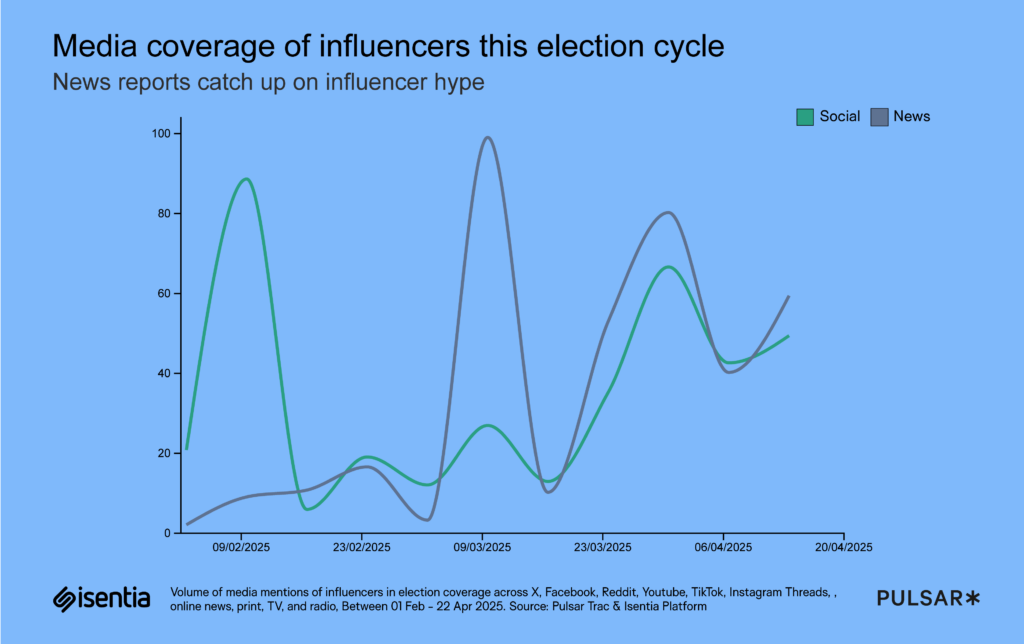
As the 2025 Australian federal election nears, influencer involvement has gained attention, with social media leading the charge while news coverage initially lagged. Prime Minister Anthony Albanese and Opposition Leader Peter Dutton are tapping influencers to connect with younger voters—Albanese engages with Abbie Chatfield’s audience through values-driven storytelling, while Dutton targets young men with Sam Fricker's relatable podcasts. This reflects a broader shift from traditional media to platforms like TikTok and Instagram. Journalists are increasingly covering these influencer-driven moments, often focusing on the viral spread and political fallout. For instance, a viral February 13 video from an Israeli influencer accusing two NSW nurses of hateful comments dominated Australia’s news cycle, prompting swift political reactions. Coverage generally focuses on political responses, not the influencers themselves. This trend was also seen with Greens Leader Adam Bandt’s DJ event in Melbourne, where media noted his attempt to engage younger voters. The Australian Electoral Commission cleared Chatfield’s posts featuring Albanese and Bandt, highlighting the growing regulation of influencer political content. This focus towards viral moments over policy discussions raises questions about the impact on undecided voters and the evolving role of journalists in political engagement.
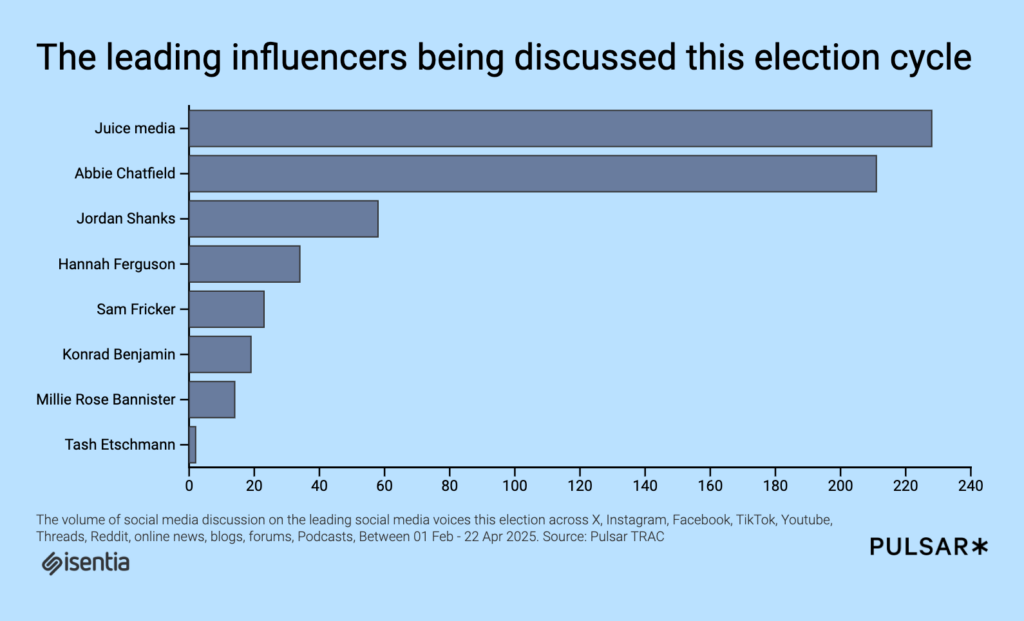
Influencers like Abbie Chatfield, The Juice Media, and Friendlyjordies are becoming central to the election rhetoric ahead of the 2025 Australian federal election. Chatfield, who faced scrutiny from the AEC, used her platform to rally support for the Greens, positioning herself against what she described as a Liberal media strategy to discredit influencers. Her posts, particularly defending her political involvement, have garnered strong support, with hashtags like #abbieisinnocent and #freeabbie dominating her comment sections. In contrast, some critics dismiss her political role, questioning her credibility. The Juice Media, known for its sarcastic takes on government policy, continues to challenge political narratives with irreverent content, resonating with younger, disillusioned voters. However, their approach also faces backlash from those who see it as too cynical or divisive. Similarly, Friendlyjordies critiques both major parties, particularly Labor’s stance on progressive issues, while encouraging followers to unite against corporate greed. His platform sparks heated debates, igniting both support and criticism.
Overall, these influencers are becoming polarising figures, amplifying political engagement while intensifying the ideological divide on social media, ultimately shaping the growing influence of social media figures in the election discourse.
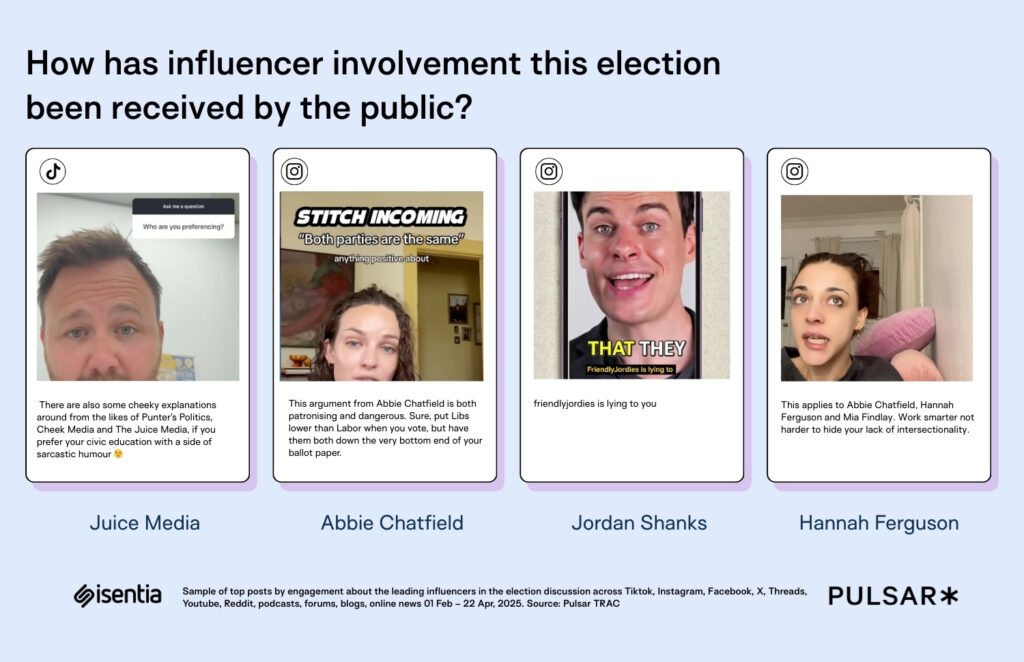
Chatfield, a vocal supporter of progressive causes like Palestinian liberation and women's rights, has gained a strong following but faces criticism for oversimplifying political issues and for her perceived naivety, especially regarding preferential voting. Ferguson, who critiques colonialism and supports Palestinian liberation, is praised by supporters but criticised for lacking depth in her activism, with some accusing her of ignoring intersectionality. Friendlyjordies, known for satirical commentary, is admired for calling out political corruption, but his critics accuse him of bias towards Labor and oversimplifying complex issues. The Juice Media, using sarcasm to critique government policies, resonates with disillusioned young voters but alienates others who find their approach too cynical. These influencers contribute to a growing divide in Australian politics, mobilising progressive movements while deepening ideological rifts, as their content both challenges traditional politics and fuels polarisation.
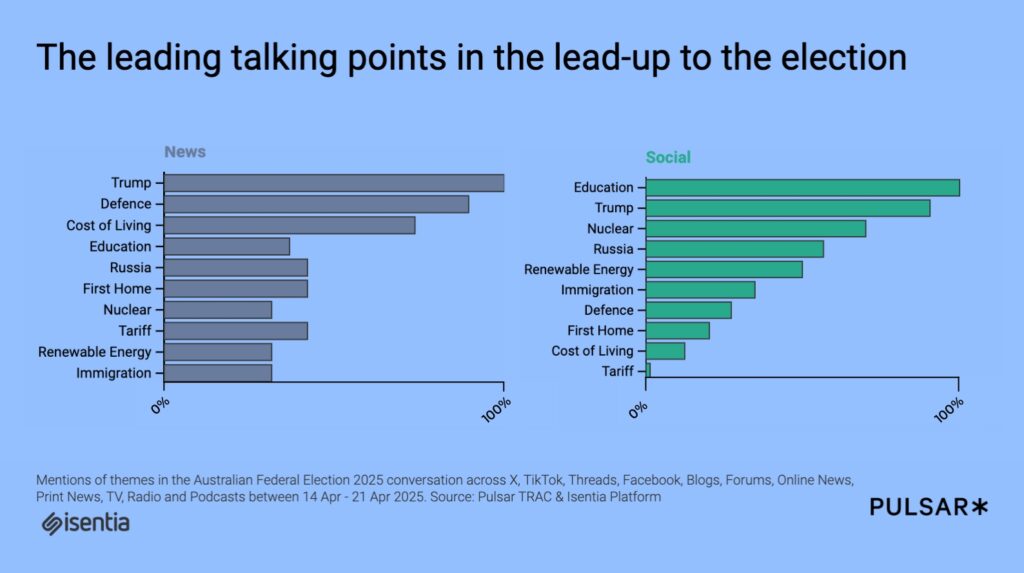
Key issues like defence, the cost of living, and education are dominating political discourse and social media conversations. Global events, including Trump’s influence on international relations and trade, have sparked strong reactions, with Albanese facing backlash over Australia’s stance on Gaza and its defence ties with Israel. Meanwhile, Dutton’s comments on Ambassador Kevin Rudd and allegations of election interference have stirred tensions. On social media, debates over defence—highlighted by Indonesia’s denial of Russia’s military presence near Darwin—and cost of living concerns are intensifying. Education remains a key point of contrast, with Albanese’s Free TAFE policy gaining support while Dutton faces criticism for prioritising fossil fuel subsidies. Influencers are driving much of this engagement, but their role in amplifying already polarised narratives raises questions about whether they are truly reflecting voters’ concerns or deepening divides as the election approaches.
These conversations play out against a landscape in which social and news media have different - but overlapping - priorities. They’re driving debates on everything from education and nuclear energy to Trump-style politics and renewable energy. With the 2025 federal election on the horizon, stories sparked by creators — whether through critique, leaks, or commentary — are becoming part of the political media mix. It’s a shift that’s unfolding in real time, and one that’s reshaping how narratives break, spread, and gain momentum. But as these voices grow louder, one thing is clear: Are they truly amplifying the concerns of everyday Australians, or are they pushing further divides in a landscape already ripe with fragmentation?
" ["post_title"]=> string(73) "The rise of influencers in the 2025 Australian federal election landscape" ["post_excerpt"]=> string(0) "" ["post_status"]=> string(7) "publish" ["comment_status"]=> string(4) "open" ["ping_status"]=> string(4) "open" ["post_password"]=> string(0) "" ["post_name"]=> string(54) "the-rise-of-influencers-in-the-2025-election-landscape" ["to_ping"]=> string(0) "" ["pinged"]=> string(0) "" ["post_modified"]=> string(19) "2025-04-24 00:08:49" ["post_modified_gmt"]=> string(19) "2025-04-24 00:08:49" ["post_content_filtered"]=> string(0) "" ["post_parent"]=> int(0) ["guid"]=> string(32) "https://www.isentia.com/?p=39404" ["menu_order"]=> int(0) ["post_type"]=> string(4) "post" ["post_mime_type"]=> string(0) "" ["comment_count"]=> string(1) "0" ["filter"]=> string(3) "raw" }With social media platforms becoming central to political engagement, figures like Abbie Chatfield, Friendlyjordies, and The Juice Media are amplifying progressive causes and challenging traditional political narratives. But how significant is their impact? Are they genuinely influencing the election conversation, or is their influence more about their ability to capture attention and drive engagement? This […]
In Singapore, the rise of podcasting has shifted from entertainment and lifestyle into a new arena – public discourse and politics. As the 2025 General Election draws near, podcasters are making waves across online news and social media. To kick things off, we used Narrative AI, the first search engine for public opinion, to identify how large the global narrative on podcasts and their influence on audiences is in the last 6 months, using data from X.
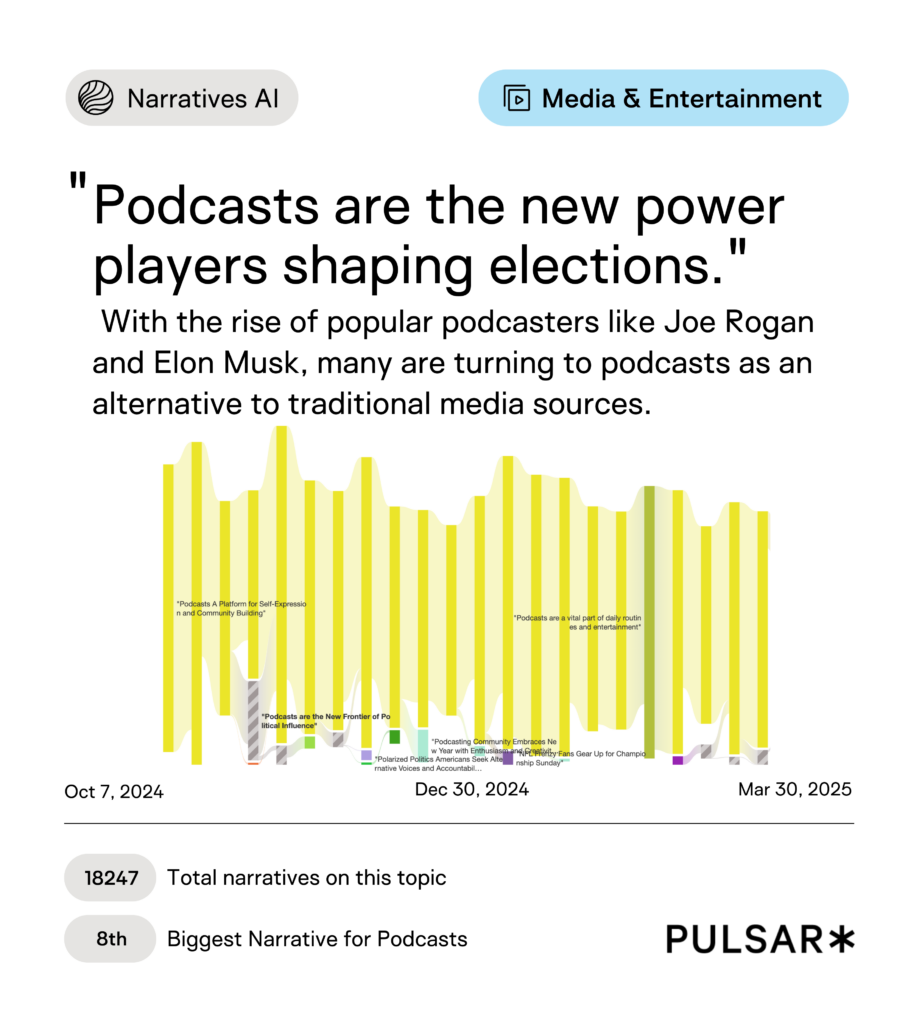
We subsequently narrowed the focus of this global trend to Singapore and analysed on Pulsar TRAC more than 7k mentions across platforms like YouTube, Facebook, Reddit, TikTok, podcasts, Online News, blogs and forums to understand where the discourse is coming from, which channels are capturing the podcasters’ content and how audiences are responding to this content.
Social media is where the larger chunk of podcast conversation is taking place, specifically those episodes that feature a political figure, journalist or those that include healthcare-related discussions. The audiences that engage with these videos, majority being on YouTube, search for political credibility that resonates with them. Young Singaporeans watching these podcasts expect to see leaders who don’t just uphold the image of being a politician, but also someone who is grounded and trustworthy.
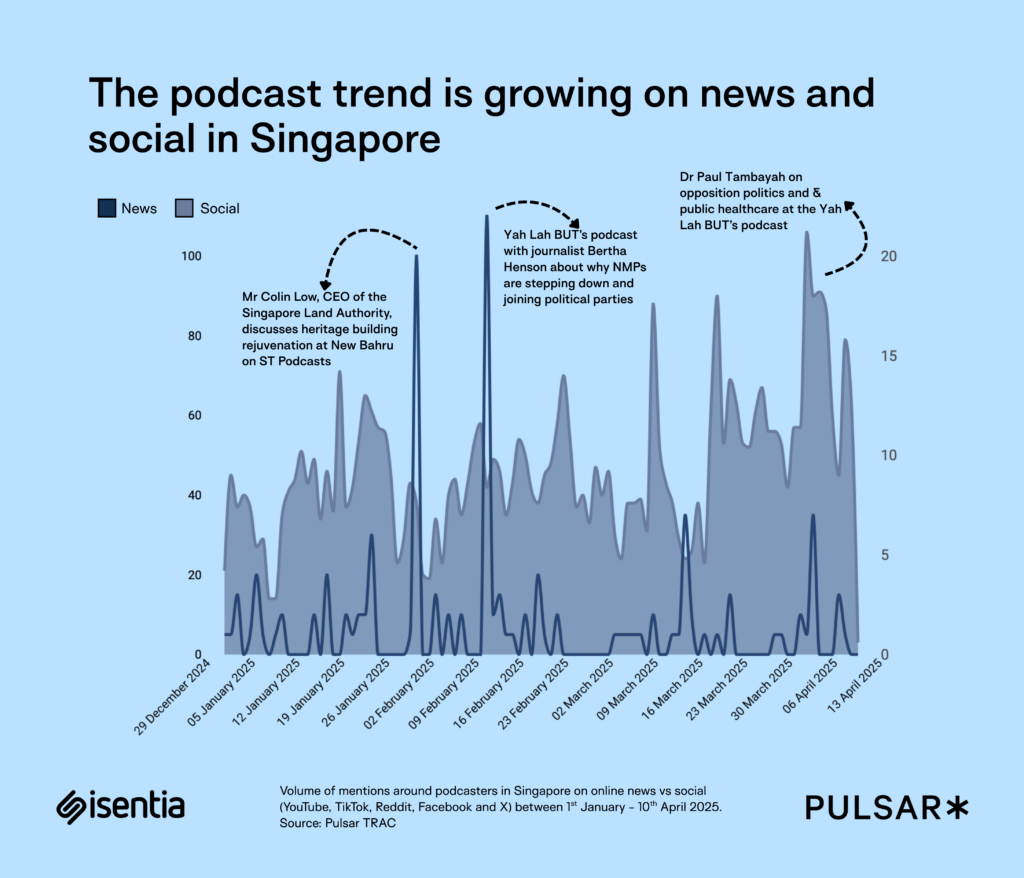
The audiences that consume these podcasts the most are young Singaporeans looking to participate in the conversation as much as they can. These audiences are being more proactive than ever.
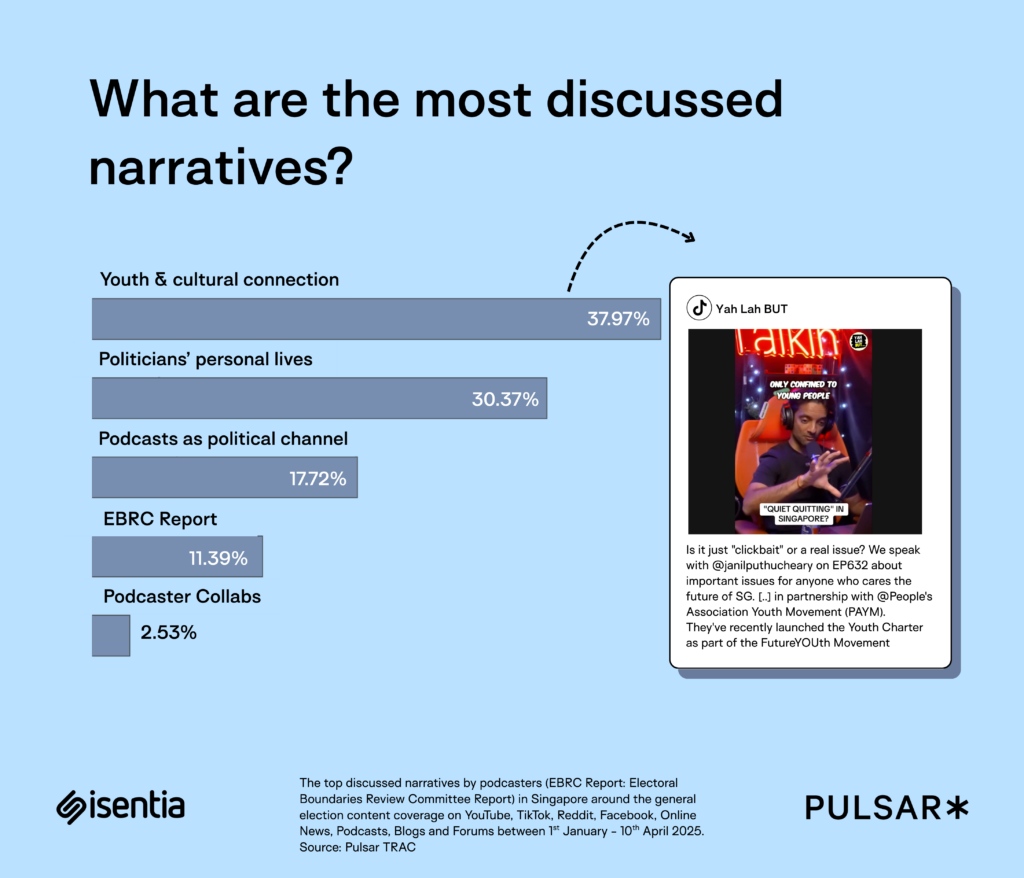
With younger voters consuming media differently, these appearances are efforts by political candidates to connect with the public. Lawrence Wong, Josephine Teo, Indranee Rajah, and Desmond Tan, have used podcasts to communicate directly with the public – sidestepping traditional media filters.
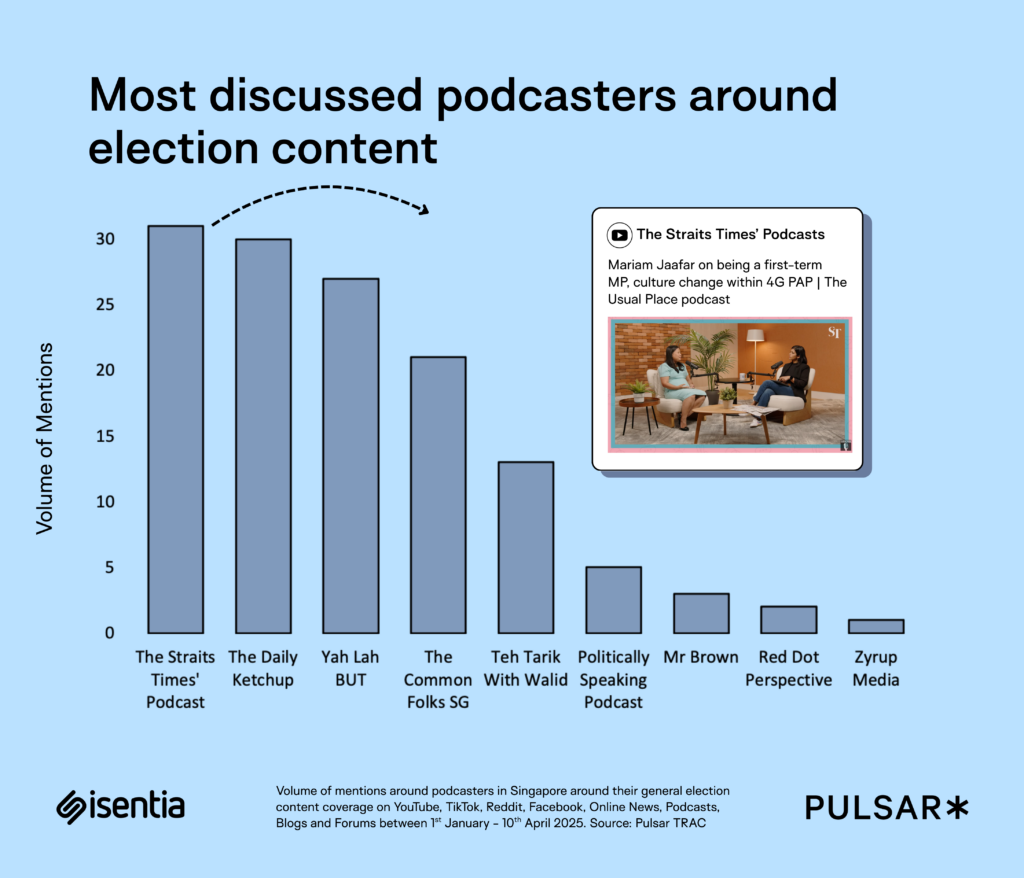
When we focus on who the most mentioned podcasters around election content are, the Straits Times’ podcasts, the Daily Ketchup and Yah Lah BUT emerge on top. These podcasts have figured that the most discourse happens around content that’s either educational or controversial around elections. The public is actively responding to political content shared via podcasts, particularly those by The Straits Times and independent shows like Yah Lah BUT.
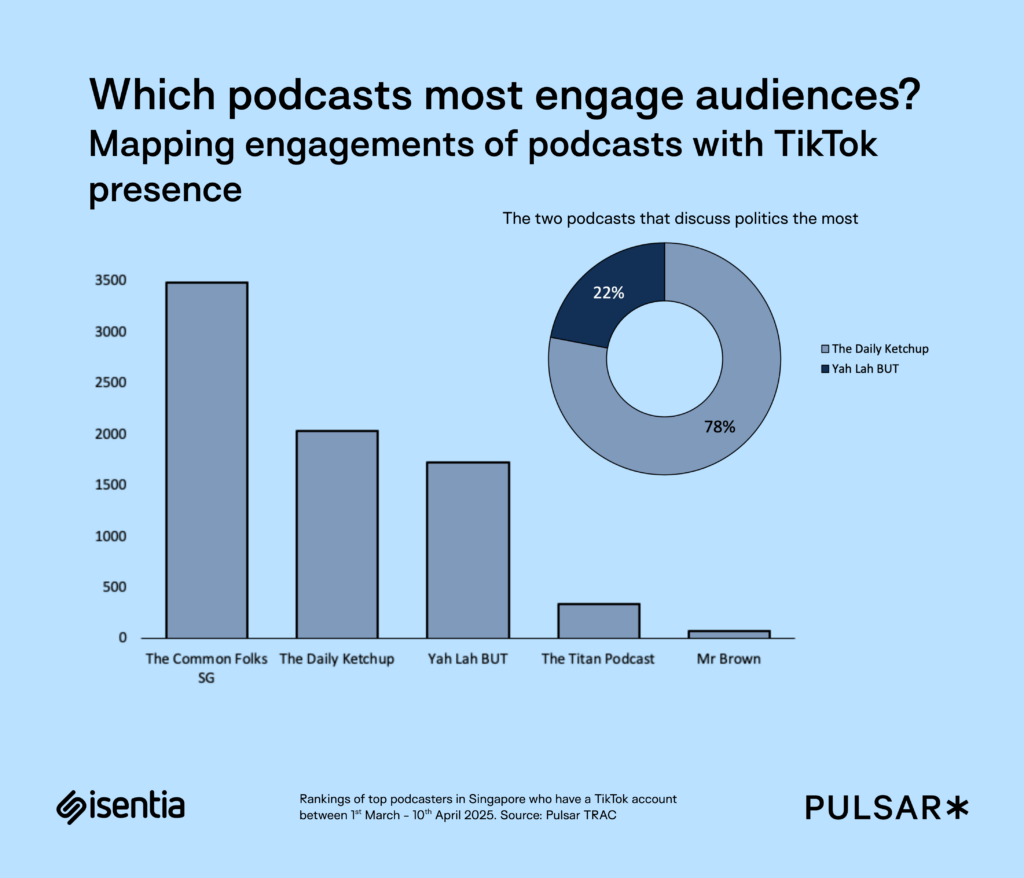
Satire and irony are key strategies to make politics palatable, especially for younger, digital-native audiences. The Daily Ketchup and Yah Lah BUT are blending serious topics like the GE2025, party agendas, healthcare, and opposition voices with humour that make them almost meme-worthy. Posts such as “PAP really said: ‘Trust me, bro’” TikTok clips show that these are genuinely made for content to go viral while retaining serious undertones too.
What’s interesting to note is that The Common Folks, with content in Malay and Indonesian, is tapping into a cross-border Southeast Asian audience and has some of the highest engagement on its content. Local slang, cultural jokes, and casual festive content like Raya greetings and songkok jokes have generated thousands of views, at times outperforming English-language political pods. This suggests a large, under-acknowledged appetite for vernacular podcast content that has a blend of humour and relatability.
Podcasts are no longer just background noise – they’re becoming one of the most relevant ways Singaporeans engage with politics. With high engagement on platforms like TikTok and YouTube, a wide spread of topics from youth issues to party politics, and growing presence in both mainstream and social media, podcasters are carving out a key role in shaping the GE 2025 conversation.
Interested in learning more? Email us at info@isentia.com
" ["post_title"]=> string(64) "What is making podcasts stand out ahead of the Singapore GE2025?" ["post_excerpt"]=> string(0) "" ["post_status"]=> string(7) "publish" ["comment_status"]=> string(4) "open" ["ping_status"]=> string(4) "open" ["post_password"]=> string(0) "" ["post_name"]=> string(65) "what-is-making-podcasts-stand-out-ahead-of-the-singapore-election" ["to_ping"]=> string(0) "" ["pinged"]=> string(0) "" ["post_modified"]=> string(19) "2025-04-16 04:30:10" ["post_modified_gmt"]=> string(19) "2025-04-16 04:30:10" ["post_content_filtered"]=> string(0) "" ["post_parent"]=> int(0) ["guid"]=> string(32) "https://www.isentia.com/?p=39139" ["menu_order"]=> int(0) ["post_type"]=> string(4) "post" ["post_mime_type"]=> string(0) "" ["comment_count"]=> string(1) "0" ["filter"]=> string(3) "raw" }In Singapore, the rise of podcasting has shifted from entertainment and lifestyle into a new arena – public discourse and politics. As the 2025 General Election draws near, podcasters are making waves across online news and social media. To kick things off, we used Narrative AI, the first search engine for public opinion, to identify […]
Get in touch or request a demo.